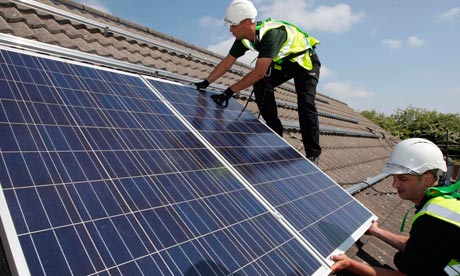
Mark Twain once said that he was "seldom able to see an opportunity until it had ceased to be one". I sometimes wonder if this government, which seems so wilfully short-sighted when it comes to good opportunities, shares the same problem. The UK solar industry, currently standing at a crossroads, is a case in point.
At a meeting on solar power organised by the Renewable Energy Association in parliament last week, we saw strong evidence – including in a recent report by Ernst and Young (pdf) – that solar has huge potential to deliver affordable and secure energy, and can play a significant role in the decarbonisation of our economy.
But if the government sticks with its policy of slashing support for large-scale solar projects, the potential for the industry to flourish here in the UK will be completely undermined.
In its review of the responses to the feed-in tariffs (Fits) consultation, the government admits that while changes to Fits may have a negative impact on investor confidence in both the solar photovoltaics (PV) sector and other renewable energy sectors, it is determined to make them because "the need for fiscal responsibility across all areas of government spending is a key objective of the coalition government."
From the outset, the government has looked at feed-in tariffs through the wrong end of the telescope. It has asked how little it could get away with spending in the short term and worked forwards from there – rather than looking ahead to the huge benefits that could come from significant investment, and working backwards.
Ministers are completely wrong to argue that the Fits programme has become an expensive measure that needs to be controlled. In the first year of the feed-in tariff, the actual spend on the scheme was only £11m. And that is not £11m just for solar – it is £11m for all technologies.
They are also wrong to suggest that Fits are adding unacceptably to energy bills. While I would prefer to see support for solar and other renewables coming from general taxation instead of from levies on bills, I do think it is important to keep things in perspective.
Last year, the cost of the solar Fit on a typical household energy bill was less than 1p per month. And the forecast cost of the domestic levy for all renewables support in this financial year is £1 – or just 0.08% of a typical household energy bill.
And the irony is that in opposition, current members of the government criticised the last government for its "modest" PV Fit scheme. The Liberal Democrats, in particular, went into the last election promising to triple the ambition of Labour's offer – saying Labour weren't doing enough. Yet now the government wants to do even less.
The evidence in favour of a different approach is overwhelming; with the right investment now, solar power can be cheaper, or at least no more expensive than average energy to produce (so-called grid parity), in the UK within a few years – and in countries with better-supported solar industries, much sooner than that.
The strength of feeling against the changes is clear – 81% of respondents to the Fit review disagreed with the proposed reduction of support for solar, and all respondents who commented on the largest PV generation band felt that the proposed tariff would not provide sufficient incentive for any installations at this scale.
This is bad news for jobs, bad news for the economy and bad news for the environment. Because despite our famously unreliable weather, the UK receives very similar levels of irradiation (sunlight) to Germany – which now employs 100,000 people in its solar industry (around 10 times the number employed in the UK). Ernst and Young's analysis clearly shows that our government is putting similar potential benefits for the UK at risk.
It is particularly frustrating that the government's advisers, the Committee on Climate Change, has failed to appreciate the worth of a more dynamic approach, arguing instead that solar power remains too expensive in the short term and that the UK should instead buy in renewable power from overseas later.
Compare this with the huge financial support that has been given to nuclear for decades. The government is so committed to reviving nuclear in the UK that the Commons energy and climate change select committee recently warned that the government risks distorting its planned reform of the entire electricity market .
Solar power has had a fraction of the support that nuclear has received over many years. In the short term, a gap remains between costs and returns: profitability is not currently possible without Fit support. Which means that fast-tracked reviews and slash-and-burn policies simply scare off many investors.
Given the potential of the solar industry to speed the UK's transition to a sustainable economy, hopefully the government will reconsider its solar policy. This would be yet another coalition U-turn that I would welcome.
* Retrieved from http://www.guardian.co.uk/environment/blog/2011/jul/04/solar-energy-britain-subsidies-fits
* color and emphasis added by the blogger
No comments:
Post a Comment